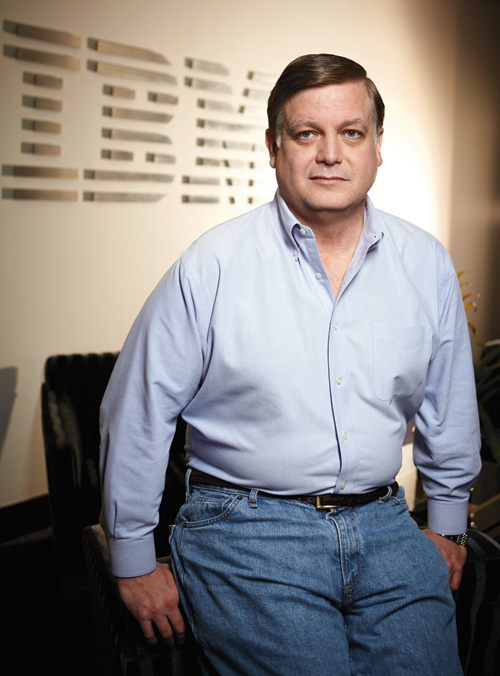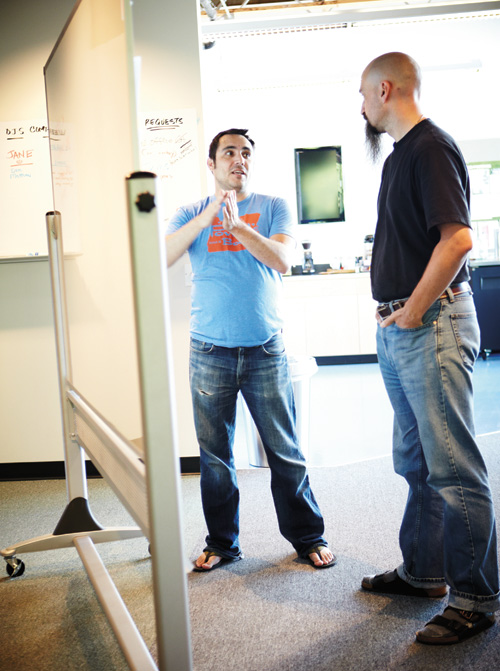 Portland lost some allure during the recession, but developers once again are smitten by its culture, community and cost of living.
Portland lost some allure during the recession, but developers once again are smitten by its culture, community and cost of living.
By Mark Everett Hall
 |
Risk taker Luke Kanies, CEO of Puppet Labs, likens Portland to “an underdeveloped stock” for entrepreneurs.Photo by Michael Cogliantry |
Two years ago when Luke Kanies was mulling over where to move his Nashville startup he considered Silicon Valley, an obvious choice for an open-source software business. But with year-old twins in tow, he and his wife decided Portland was a better fit for them financially.
“I adored Portland,” he says of making the choice to base Puppet Labs in the city. “And we could afford it.”
Another key factor for Kanies’ relocation to Oregon from Tennessee was the proximity of experienced, open-source software developers. Without talented people to help, he knew that by himself he couldn’t build the software as he envisioned it. He needed skilled programmers and Portland had them, as he knew, from previous visits to the city for OSCON, the biggest conference for open source techies.
Finding top-notch technical talent is always an issue for companies large and small. That’s why it’s becoming more commonplace these days, especially in the software industry, to have remote workers,who work from the comfort of their own homes. Currently, though, only two Puppet Labs developers work remotely because CEO Kanies has been able to locate the bulk of his staff locally. His other 38 employees work in the company’s Park Blocks offices. He says those few times he’s had to fish for folks outside the area, there’s been no trouble recruiting people to come to Portland.
“If people were willing to relocate at all,” he says, “they’re willing to move to Portland.”
Portland’s lure lost some luster when the Great Recession hit. Developer jobs evaporated. Investment stalled in the open-source market. But the economic speed bump was a small one. Drawn to the area by its culture, community and cost of living, open-source developers continued to flock to the area, which, in turn, attracted the companies who needed them.
 |
Puppet Labs plans to fill its Park Blocks offices with specialists in the Ruby development language.Photo by Michael Cogliantry |
Skip Newberry, an economic policy adviser in the mayor’s office [now the new president of the Software Association of Oregon], says when it comes to attracting software companies to locate in the region, “Our No. 1 asset is our talent pool of developers in the area.”
Serial entrepreneur Brian Jamison, who has been developing software and video-game products using open source since 1995, “escaped Los Angeles” and located OpenSourcery LLC here in 2004. One of its attractions, he says, is the region “is friendly for incubating technologies.”
He says the open source “spirit” pervades the region. Jamison points to the Portland-based Legions of Tech, which organizes free technology-education programs for the area, adding, “The events are geek — not marketing — oriented and are relevant to people like me who are interested in technology.”
Less formal events, such as the weekly get-togethers among those conversant in open source and beer at the Green Dragon pub, he says, “are a great way to spend an evening.”
According to Jamison, it’s natural for OSCON and other similar events, such as the Open Source Bridge Conference, to host their respective conferences here. He says it’s the right combination of enough people living here who work in open source and enough people wishing to visit Portland that help make these events worthwhile.
The venture capital community is taking its sips from the streams of the region’s open-source companies as well. Since last summer, Portland startups Puppet Labs snagged $5 million in venture money from Kleiner Perkins; ShopIgniter landed $8 million from Trinity Ventures and Madrona Venture Group; and the Collaborative Software Initiative took $3.7 million from OVP Ventures.
“It’s almost like there’s something in the water here,” Jamison says.
 |
Kyle Smith (left) and Scott Campbell of Puppet Labs discuss new features for an upcoming software release.Photo by Michael Cogliantry |
Not that long ago, the region’s place in the open-source community’s imagination was fading. Battered by the 2008 economic meltdown, OSCON failed to show in 2009 in Portland for the first time in six years, relocating that year to Silicon Valley. Its departure hurt not only the area’s open source luster, it hurt Portland. Jeff Blosser, executive director of the Oregon Convention Center, ranks OSCON as one of the OCC’s top 10 events each year, generating about $1.5 million for local businesses, such as hotels and restaurants.
If losing OSCON weren’t enough, the Open Source Development Labs moved from Corvallis to San Francisco the same year. Startups found funding difficult. The Open Technology Business Center changed its name to the Oregon Business Technology Center and broadened its mission beyond incubating open-source-related technology companies. It looked as though the idea of creating an open-source mecca in the region was turning into a myth.
But it turns out the Great Recession was just a hiccup in open source’s ongoing success in the region. OSCON returned for the second straight year this summer. According to Gina Glaber, the company’s vice president of conferences, while the Silicon Valley OSCON was a financial success, “Portland, overall, is a better match.” She says, “Yes, there are more open-source companies in the Bay Area, but Portland is a better match culturally.”
There is, indeed, a culture match between open source and the region. People cite the do-it-yourself attitudes in Oregon that fit the hands-on fervor of open-source developers. Others point to the link between the open-source community’s affinity for beer and the microbrew culture of the area.
When the devotees of Portland’s Puppet Labs software come to town in September for the company’s semi-annual conference, Luke Kanies has arranged for a tour of local breweries. He says the combination of open-source developers and microbrews “just fits.”
“When I’m pitching people to come here,” says Daniel Frye, IBM’s vice president for Open Systems in Hillsboro, “I always mention that we’re the biking and brewpub capital of the world.”
 |
IBM VP Daniel Frye says his company has worked with universities and local entrepreneurs to help develop open-source expertise.Photo by Michael Cogliantry |
Arguably more important than culture is the business model that worked well for technology-rich regions like Silicon Valley and the ring of tech companies around Boston and Seattle that is also at play in Portland. That is, marry the interests of industry technology heavyweights and entrepreneurs with technology education.
The tech heavyweights in this case are IBM and Intel. They have long provided a core employment base for hundreds of open-source programmers. They also underwrite open-source education efforts by sponsoring local industry conferences as well as funding targeted university computer science programs in Oregon.
Daniel Frye helped create IBM’s Linux Technology Center in Beaverton in 1999. It was established in the area, says the company’s vice president for open systems, because he lived here. Now there are more than 700 developers in his group spread out across the globe in a half dozen countries and even more states. Still, Frye says IBM does often recruit open-source experts to relocate to the area. So 100 of them reside in Oregon. That core of local developers helped spur IBM to become one of the major sponsors of OSCON since its arrival in Portland in 2003.
Like IBM, Intel’s cadre of open-source developers are scattered around the world. But the company’s Open Source Technology Center is based in Beaverton. Doug Fisher is vice president of software and services group and manages the Center. He calls Oregon “a hub of open-source work.” In large measure, he says, it’s because “Oregon tends to be a place where a lot of software developers reside.”
Even with that residence preference, companies like Intel can never get too many talented workers to choose from. So it has funded a course at Oregon State University devoted to the methods used by open-source developers to build software. Giant companies like Intel as well as startups want newly minted computer science graduates to be open-source savvy, says Carlos Jensen, an assistant OSU professor in the school of engineering and computer science. So it put together an innovative program for freshmen to teach them about open source early in their college career. Intel gave OSU $210,000 to underwrite the effort.
 |
Puppet Labs software is used to manage and automate large corporate data centers. Making it intuitive and powerful to use is the focus of VP Teyo Tyree (left) and user experience expert Randall Hansen.Photo by Michael Cogliantry |
OSU also happens to be the physical home for the holy grail of open source: the Linux kernel. Linux, like Windows, is an operating system that controls a computer’s hardware. Virtually every open-source program works on Linux, and was written by Lake Oswego resident Linus Torvalds. The kernel is the heart of Linux and its source code rests on disk drives housed in the Open Source Labs on the OSU campus along with other major open-source software code such as Apache and Drupal.
“The Lab connects the dots between academia, economic development and companies,” says Deborah Bryant, public sector communities manager at OSL.
It’s likely that open source will continue to thrive in the region. For one thing, Portland under Mayor Sam Adams has launched a number of projects, such as CitySync, PDX Reporter and more, based on open- source technologies. And the mayor has been a high-profile supporter of open source by being a regular keynote speaker at OSCON and Open Source Bridge. Transit agency Tri-Met also evaluates open-source software for every software purchase.
In addition to the city, the state of Oregon in 2003 was the first in the nation to mull legislation to force agencies to consider open source as an alternative to commercial products. Although it did not pass into law, the state does have a charter statement from its CIO Council to “consider open-source opportunities to accomplish the mission of state government and achieve the state’s business objectives.”
Beyond that, open source is doing great on its own. Market researcher IDC says open source is a $5.8 billion industry growing at 22% annually, much faster than the 8% growth of the commercial software business. A lot of that new growth promises to happen in Oregon because if history tells us anything, the vibrant open-source community here will lure more businesses, which will generate more jobs, which attract more developers, creating an expanding virtuous circle of technical talent and talent-hungry enterprises in the region.
Mark Everett Hall is a Salem-based journalist who has been a writer and editor for Computerworld, MacWeek, and Performance Computing. He can be contacted at [email protected].


